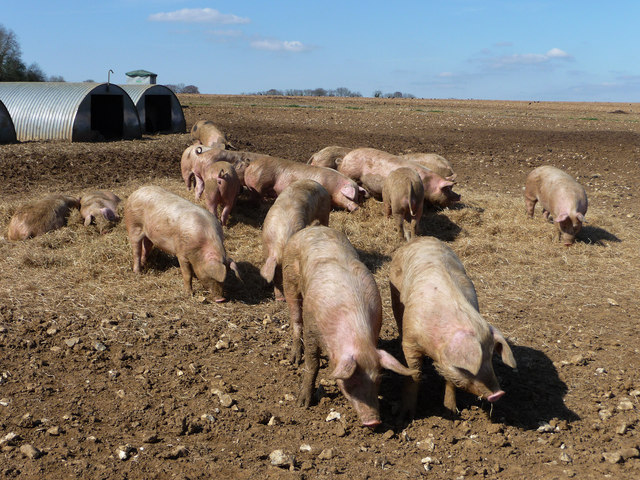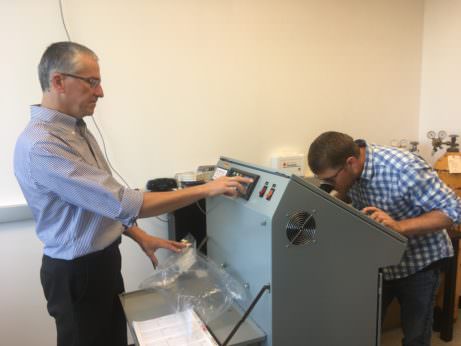Is Black Light the Path to a Stink-Free Livestock Farm?
Researchers at Iowa State University are using a new technique involving the UV light-producing device to help reduce bad odors on the farm.
Is Black Light the Path to a Stink-Free Livestock Farm?
Researchers at Iowa State University are using a new technique involving the UV light-producing device to help reduce bad odors on the farm.

This could be a big deal, especially for farms that are in peri-urban areas where farmers and non-farmers clash over the smells emanating from livestock operations.
The process is called photocatalysis and involves coating a surface – say, a barn wall – with a thin layer of titanium dioxide, a common chemical compound used as a whitener in a variety of products, from toothpaste to bread. The researchers then shine a black light on it, which emits long-wave ultraviolet light that look bluish-purple (and make anything white-ish, including your teeth, seem to glow). When the UV light hits the titanium dioxide, it produces a reaction that neutralizes the odors, breaking up the smelly gases into smaller particles that don’t stink as much.
Jacek Koziel, an associate professor of agricultural and biosystems engineering, and his team are seeing great promise using photocatalysis in lab settings in the realm of reducing various stink-producing compounds, like dimethyl trisulfide and butyric acid, by 40 to 100 percent. The results have also been pretty good in limited real-world testing at a Northeast Iowa pig farm, with a 16 percent total reduction of foul odors, according to the researchers.
Besides its stinky odor, farm animals waste is also bad for the environment since it releases greenhouse gases, like nitrous oxide, into the atmosphere, among other issues. According to Koziel, their system also reduced nitrous oxide emissions by nine percent.
“That’s actually quite puzzling, but if that holds true in more replicated experiments and in whole facilities, that would be an awesome finding,” he told The Ames Tribune.

The researchers’ next step is more complete real-world testing at Iowa pig farms, including coating barn ceilings and walls with the titanium dioxide and hitting it with black light. Koziel says it’s important to study the system outside the lab since conditions – like air flow – differ from one livestock facility to another. If the testing continues to go well, the research team plans to bring the system to market with their industrial partner, Pureti Group LLC, which produces the titanium dioxide coating.
SaveSave
SaveSave
SaveSave
Follow us
This work is licensed under a Creative Commons Attribution-NoDerivatives 4.0 International License.
Want to republish a Modern Farmer story?
We are happy for Modern Farmer stories to be shared, and encourage you to republish our articles for your audience. When doing so, we ask that you follow these guidelines:
Please credit us and our writers
For the author byline, please use “Author Name, Modern Farmer.” At the top of our stories, if on the web, please include this text and link: “This story was originally published by Modern Farmer.”
Please make sure to include a link back to either our home page or the article URL.
At the bottom of the story, please include the following text:
“Modern Farmer is a nonprofit initiative dedicated to raising awareness and catalyzing action at the intersection of food, agriculture, and society. Read more at <link>Modern Farmer</link>.”
Use our widget
We’d like to be able to track our stories, so we ask that if you republish our content, you do so using our widget (located on the left hand side of the article). The HTML code has a built-in tracker that tells us the data and domain where the story was published, as well as view counts.
Check the image requirements
It’s your responsibility to confirm you're licensed to republish images in our articles. Some images, such as those from commercial providers, don't allow their images to be republished without permission or payment. Copyright terms are generally listed in the image caption and attribution. You are welcome to omit our images or substitute with your own. Charts and interactive graphics follow the same rules.
Don’t change too much. Or, ask us first.
Articles must be republished in their entirety. It’s okay to change references to time (“today” to “yesterday”) or location (“Iowa City, IA” to “here”). But please keep everything else the same.
If you feel strongly that a more material edit needs to be made, get in touch with us at [email protected]. We’re happy to discuss it with the original author, but we must have prior approval for changes before publication.
Special cases
Extracts. You may run the first few lines or paragraphs of the article and then say: “Read the full article at Modern Farmer” with a link back to the original article.
Quotes. You may quote authors provided you include a link back to the article URL.
Translations. These require writer approval. To inquire about translation of a Modern Farmer article, contact us at [email protected]
Signed consent / copyright release forms. These are not required, provided you are following these guidelines.
Print. Articles can be republished in print under these same rules, with the exception that you do not need to include the links.
Tag us
When sharing the story on social media, please tag us using the following: - Twitter (@ModFarm) - Facebook (@ModernFarmerMedia) - Instagram (@modfarm)
Use our content respectfully
Modern Farmer is a nonprofit and as such we share our content for free and in good faith in order to reach new audiences. Respectfully,
No selling ads against our stories. It’s okay to put our stories on pages with ads.
Don’t republish our material wholesale, or automatically; you need to select stories to be republished individually.
You have no rights to sell, license, syndicate, or otherwise represent yourself as the authorized owner of our material to any third parties. This means that you cannot actively publish or submit our work for syndication to third party platforms or apps like Apple News or Google News. We understand that publishers cannot fully control when certain third parties automatically summarize or crawl content from publishers’ own sites.
Keep in touch
We want to hear from you if you love Modern Farmer content, have a collaboration idea, or anything else to share. As a nonprofit outlet, we work in service of our community and are always open to comments, feedback, and ideas. Contact us at [email protected].by Andrew Amelinckx, Modern Farmer
October 18, 2017
Modern Farmer Weekly
Solutions Hub
Innovations, ideas and inspiration. Actionable solutions for a resilient food system.
ExploreExplore other topics
Share With Us
We want to hear from Modern Farmer readers who have thoughtful commentary, actionable solutions, or helpful ideas to share.
SubmitNecessary cookies are absolutely essential for the website to function properly. This category only includes cookies that ensures basic functionalities and security features of the website. These cookies do not store any personal information.
Any cookies that may not be particularly necessary for the website to function and are used specifically to collect user personal data via analytics, ads, other embedded contents are termed as non-necessary cookies.